 |
|
An election commission official displays a ballot paper to the media while counting votes during a constitutional referendum vote at a polling station in Bangkok, Thailand, August 7, 2016. [Photo/Agencies] |
Abhisit Vejjajiva, former prime minister and current leader of the Democrat Party, said the draft constitution has big defects in combating corruption, adding that it cannot help ease political and social conflicts and it triggers even more serious conflicts, primarily due to the lessened roles of the elected politicians.
Prayut Chan-o-cha, current Thai prime minister and leader of the NCPO, said on Friday that he would vote yes to both questions.
Suthep Thaugsuban, who led the protest against Yingluck Shinawatra's Pheu Thai Party government from 2013 to 2014 that paved the way for the 2014 coup, expressed his strong support to the draft constitution and said it will help to reform the country.
The referendum is the second ever in Thai history, following the first in 2007. The Election Commission set a goal of 80 percent turnout, compared with the 57.61 percent turnout in 2007.
Thailand has endured 13 successful military coups and 11 attempted takeovers since a constitutional monarchy replaced an absolute one in 1932. If adopted, the constitution in question will become the 20th constitution of Thailand.
A general election will be held in 2017 following the approval of the constitution, Prayut said.